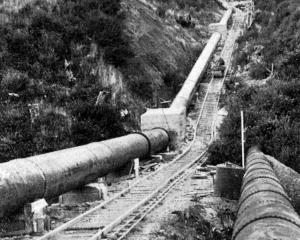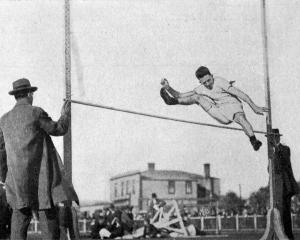
Bishop Nevill gave an address, basing his remarks on the vision of the young man whose eyes were opened by the Lord to behold horses and chariots of fire round about the prophet Elisha, as narrated in the seventh chapter of Second Kings. The speaker said that this exhibition of care that God had for His people of old led one to ask whether it was not possible for the angels of God to have some interest in the war that was being carried on in the world today. We were told that this was a war with a moral basis. It was not a war between nations for a strip of territory. It was a war for truth and righteousness, for the integrity of treaties, and for the liberty of the human race, and as the angels were the most perfect agents of God, surely they, too, would have an interest in the progress and consequences of the war. It was part of the eternal war between good and evil.
Mr J. J. Clark (Mayor of Dunedin) moved the following motion: ‘‘That on this fourth anniversary of declarations of a righteousness war this meeting of the citizens of Dunedin records its inflexible determination to continue to a victorious end the struggle in maintenance of those ideals of liberty and justice which are the common and sacred cause of the Allies.’’ As we believed we were fighting in this war, not for our own selfish ends, but for the ends of righteousness and the ends of God, no apology was necessary for submitting the motion at a religious service on a Sunday afternoon.
Ploughman’s importance
According to Sir James Wilson, the most important man in New Zealand today from an agricultural point of view, is the ploughman, and in support of an appeal before the Military Service Board at Marton Sir James contended that no ploughman should be allowed to leave the dominion just now. The stores, he said, were full of mutton, and in view of the shipping difficulties there now seemed every possibility that lambs would have to be carried over next winter. Feed, therefore, would be absolutely necessary, and the country could not afford to allow its ploughmen to go away, if production was to be kept up. To keep the lambs in the paddocks instead of the freezing chambers was going to be a very serious tax upon the resources of the producers, as feed would have to be grown to meet the requirement. At present ploughing was very badly affected by the weather, and unless a more favourable change came soon the difficulties would increase.
Solid drinks
At Lower Shotover, where the frost has been intense, a novel sight presented itself in the local hostelry. On the bar shelves were to be seen solid blocks of lemonade or ginger-beer, with the bottles lying in pieces around them.
Popular job
Evidently the position of borough librarian to Invercargill is one to be sought after (says the Southland Times). The Town Council had before it at its last meeting 51 applications coming from many places between Auckland and the far south. The applicants, included amongst whom are several returned soldiers, are composed largely of ladies. — ODT, 5.8.1918












